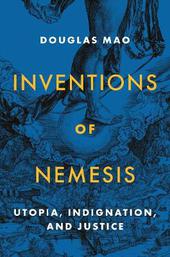
|
Inventions of Nemesis: Utopia, Indignation, and Justice
Hardback
Main Details
| Title |
Inventions of Nemesis: Utopia, Indignation, and Justice
|
| Authors and Contributors |
By (author) Douglas Mao
|
| Physical Properties |
| Format:Hardback | | Pages:296 | | Dimensions(mm): Height 235,Width 156 |
|
| Category/Genre | Literature - history and criticism
Literary studies - general |
|---|
| ISBN/Barcode |
9780691212302
|
| Classifications | Dewey:335.02 |
|---|
| Audience | |
|---|
|
Publishing Details |
| Publisher |
Princeton University Press
|
| Imprint |
Princeton University Press
|
| Publication Date |
10 November 2020 |
| Publication Country |
United States
|
Description
A wide-ranging reevaluation of utopian literature and philosophy, from Plato to Chang-Rae Lee Examining literary and philosophical writing about ideal societies from Greek antiquity to the present, Inventions of Nemesis offers a striking new take on utopia's fundamental project. Noting that utopian imagining has often been propelled by an ang
Author Biography
Douglas Mao is Russ Family Professor in the Humanities at Johns Hopkins University. He is the author of Fateful Beauty: Aesthetic Environments, Juvenile Development, and Literature, 1860-1960 and Solid Objects: Modernism and the Test of Production (both Princeton).
Reviews"Inventions of Nemesis is undoubtedly an extremely interesting book."---Seamus Flaherty, Marx and Philosophy Review of Books "Readers of all stripes will appreciate Mao's consistent attention to context and to the parallels among old favorites and more recent works. This is a valuable addition to the conversation on Utopias." * Choice Reviews * "A brilliant, erudite, and transformative interpretation of utopia as an exercise in justice. . . . Its arguments will influence scholars working in utopian studies, early modern and modern literatures, global justice theories, and migration studies."---Greg Forter, Modernism/modernity "Douglas Mao's erudite, keen-eyed, and deeply rewarding volume mounts a subtle polemic against how the discipline understands itself, and it does so by adding to its options for understanding what ethics is."---Bruce Robbins, Novel
|